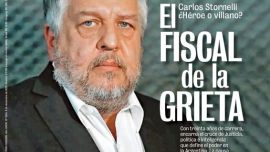President Sebastián Piñera has welcomed a United Nations team of investigators to Chile, saying his country and its security forces have "nothing to hide," despite claims of excessive forces and abuse by police and other law enforcement agencies.
Protests that have gripped Chile for nearly three weeks to demand better salaries and pensions, and a more equal distribution of the wealth, have shrunk in size this week, just as attention falls on the actions of the security forces.
On the heels of a holiday weekend, Tuesday's gathering drew just 2,000 to 2,500 people, according to an estimate by Felipe Guevara, mayor of the Santiago metropolitan region. The same square earlier hosted 1.2 million protesters.
Chileans calling for better social services poured into downtown Santiago the day after the government announced the protests are hurting the country's economic growth.
Finance Minister Ignacio Briones warned Monday that negative economic impacts from the protests have cost the country somewhere between US$2 billion and US$3billion, forcing officials to lower their 2019 economic growth prediction to between 2 percent and 2.2 percent from 2.6 percent.
His announcement was met with disdain by protesters who said they have not shared in Chile's economic prosperity.
'Growth is a fallacy to hide inequality'
Marcos Díaz, a 51-year-old teacher protesting in the capital of Santiago, said big corporations have been the biggest beneficiaries.
"Through all these years of democracy, we've been living with a minimum wage that puts 60 percent of the workers below the poverty line," he said. "Growth is a fallacy invented by this model to hide the inequality of this country."
Accountant Veronica González said even though she believes people are losing money from the protests, they'll get it back later and that "this fight has to go on anyway."
Protesters have slammed what they label a "neoliberal" economic model that on the surface makes Chile seem like a Latin American economic success story — masking a widely criticised pension system and hybrid public and private health and educations systems that give better benefits to the rich, who can afford to pay more.
Many protesters are demanding a new constitution to replace the 1980 charter written under general Augusto Pinochet's 1973-1990 military dictatorship. It allows many social services and natural resources, including water, to be wholly or partially privatised.
Resilience
Police used tear gas, water cannons, and hooded infiltrators to disperse the crowds, resilient in their demands even as a hurricane struck the country's capital Monday. No casualties or damages were reported, but people in Santiago felt buildings sway, according to reports from Associated Press.
Javiera Martínez, a 23-year-old student, told the Associated Press that she is still protesting because "the demands have not been heard, they have not wanted to hear the social discontent."
Bastian Marín, 29 and a business executive, attributed the smaller protest to the fact that people have to work.
"It's hard to have the same number of people every day," he said, adding that a march planned for Friday is expected to be much larger.
Small protests also occurred in other Chilean cities.
In Concepción, a city about 300 miles (500 kilometers) south of Santiago, hooded people ransacked a bank in the middle of a protest, pulling out furniture and lighting it on fire in the street.
The unrest began 19 days ago over a hike to subway fares, but it has grown into a massive movement demanding a broad range of changes. Chile's centre-right government has responded with a host of proposed social improvements, which must still be approved by Congress.
Santiago's subway system has said that it has suffered nearly $400 million in damages, while businesses in Chile are estimated to have lost more than $1.4 billion in damages to arson, looting and lost sales.
At least 20 people have died in clashes amid looting and arson that forced the cancellation of two upcoming major international summits and the Copa Libertadores football final.
Human rights investigations
Claims of excessive force and abuse by police and other law enforcement have emerged during the weeks-long protests. Many of these abuses are believed to have taken place during the first nine days of protests, during which President Piñera instituted martial law, ordering military and police to patrol the streets.
The United Nations Council for Human Rights, led by former Chilean president Michelle Bachelet, recently sent a team of investigators to evaluate potential violations, a mission Piñera has said he welcomes as part of his campaign of total transparency around the issue.
We have "nothing to hide," he said Wednesday, in response to a claim filed by the National Institute of Human Rights tallying 181 instances of alleged actions by law enforcement including homicide, sexual violence and torture.
Piñera said he remains completely committed to Chile's Armed Forces.
'Regional success story'
From afar, Chile has been viewed a regional success story under democratically elected presidents on the left and right. A free-market consensus has driven growth up, poverty down and won Chile the Latin America's highest score on the United Nations Human Development Index, a blend of life expectancy, education and national income per capita.
And in 2010, Chile became the second Latin member of the Organisation for Economic Cooperation and Development, after Mexico.
But a 2017 UN report found that the richest one percent of Chile's population earns 33 percent of the nation's wealth. That helps make Chile the most unequal country in the OECD, slightly worse than Mexico.
Piñera is a billionaire and one of the country's richest men. He's replaced the heads of several ministries with generally younger officials seen as more centrist and accessible and introduced a series of economic reforms, including increases in the minimum wage and lowest state pensions. But he has struggled to contain the protests and is facing calls to resign.
--AP/AFP/TIMES



















Comments